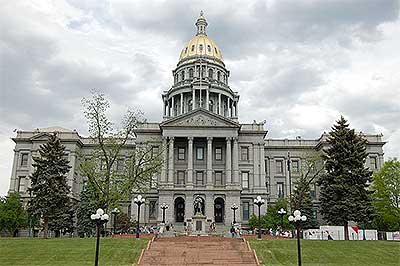Support Regulatory Reform and Best Practices

Colorado State House
Ending "energy sacrifice zones"
There are areas of the United States that are effectively -- thanks to neglect via inadequate public oversight -- energy sacrifice zones. For example, the gaspatch of Colorado, New Mexico, Wyoming, and the coal belt of Appalachian states.
In these zones, drilling for oil and gas, and mining coal have altered landscapes and affected the health and wellbeing of citizens and ecosystems.
Until clean energy alternatives replace oil and gas and coal and uranium, dirty energy will continue to be extracted from these areas -- making possible modern lives for people far from the too-often polluted drinkingwater and air.
So as long as energy extraction occurs anywhere in the U.S., ALL of us must insure it occurs only with strong public oversight. Because keeping the a family warm through a New York winter must not occur at the expense of the health of a family in Colorado, or Texas, or anywhere else.
Reforming regulatory oversight
Organized citizen opposition can play a crucial role in determining whether oil and gas permits are issued, the level of enforcement and oversight, and what sort of surface owner protections the laws and regulations offer. For example, in 2010 citizens in improved a Pennsylvania gas well permitting process.
At the state level, Earthworks' Oil & Gas Accountability Project has initiated and aided citizen efforts to improve their environment and quality of life by supporting
- successful Surface Owner Protection laws in New Mexico,
- overhauling Colorado oil and gas regulations to provide increased protections for communities concerned with the industry’s impact on public health, watersheds, private landowners, and overall land use
- asking for the first ever state disclosure rule for hydraulic fracturing chemicals and other toxic substances used to drill and develop oil and gas wells
- achieving a low-frequency noise provision for oil and gas operations in Colorado
Requiring best practices
In addition to regulations, individual citizens, communities and organizations like Earthworks can push companies to use “best practices” to --
- minimize emissions,
- noise,
- traffic,
- spills of toxic substances, and
- other negative impacts associated with oil and gas development.
In some cases, citizens have been able to minimize the impacts to land and quality of life by requiring best practices in their leases.
Citizens have also been able to pass laws and regulations that have required companies to use best practices.
For example, in New Mexico, citizens’ groups were instrumental in passing the ”Pit Rule”, which prohibited unlined pits, thus encouraging the use of closed-loop drilling systems (a “best practice”). Since the enactment of the pit rule there have been no new groundwater contamination cases documented from oil and gas pits.
For more information:
- Earthworks: Regulatory reforms. How affected citizens are working to improve local, state and federal regulations.
- Earthworks: Oil and gas production best practices overview.
- Earthworks: Gas at your door? Tips for landowners. Brochure.
Follow Earthworks